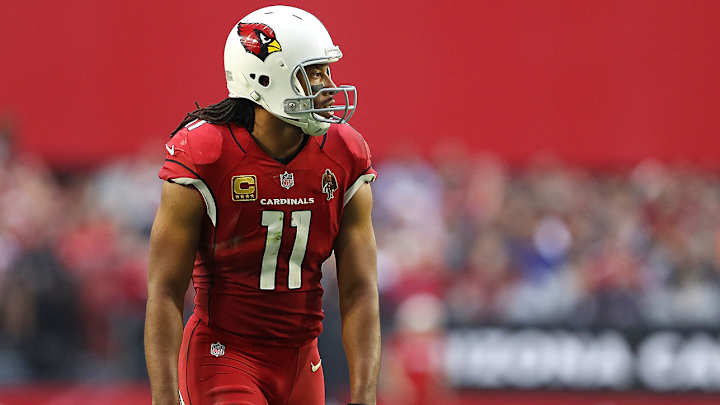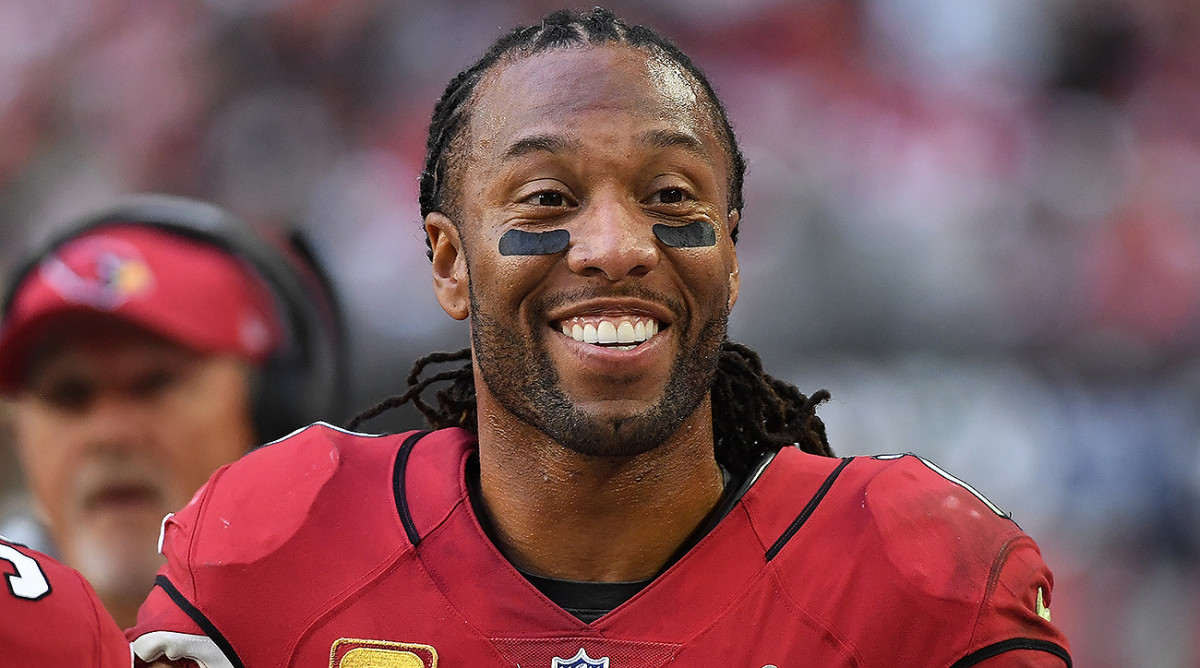Larry Fitzgerald Looking To Elevate His NFL Career into Rarefied Territory

Larry Fitzgerald will be returning for a 15th NFL season in 2018—a surprising development given that the Cardinals are starting over with a new head coach, quarterback and offensive system.
But in a way, the change and tumult suit the 34-year-old well. It has helped define his career to date.
Fitzgerald will have a legitimate chance to pass Terrell Owens as the No. 2 receiver in NFL history this year, currently sitting 389 receiving yards behind the recently-inducted Hall of Famer. Fitzgerald also has an outside chance at moving into second place all-time in receptions, as he trails tight end Tony Gonzalez by 91 catches (over the past three seasons with Carson Palmer, Fitzgerald has averaged 108 catches per year).
Other milestones within reach? Sole possession of sixth place all time in touchdowns for a receiver (Fitzgerald has 110, one behind Gonzalez at 111, four behind Antonio Gates at 114 and 18 behind Marvin Harrison at 128), a top 20 finish in receiving yards per game (he is 21st at the moment, 0.5 yards per game behind Charley Hennigan), and a chance to pass John Riggins (116 scores) for sole possession of 12th on the league’s all-time touchdown list.
He has done all this across 14 years despite having just two Pro Bowl-caliber seasons from any quarterback he’s played with—Carson Palmer in 2015, and Kurt Warner in ’08.

While it wouldn’t be fair to wonder how much closer Fitzgerald could be to Jerry Rice—the undisputed greatest receiver in NFL history—had he played with better quarterbacks, it is important to examine his accomplishments through the lens of his quarterback play and organizational stability.
Rice spent the majority of his prime in San Francisco with Joe Montana and Steve Young. He rounded out his time with the 49ers with a Pro Bowl season from Jeff Garcia (31 touchdowns, 10 interceptions) before two seasons in a high-octane Raiders offense piloted by Rich Gannon. His offensive coordinators were Bill Walsh, Mike Holmgren, Mike Shanahan, Marc Trestman and Marty Mornhinweg.
Fitzgerald had Dennis Green and Ken Whisenhunt as head coaches for more than half his career. His offensive coordinators included Alex Wood (QBs coach at the University of Delaware), Keith Rowen (out of football), Mike Kruczek (currently the head coach at Trinity Prep high school), Todd Haley, Ken Whisenhunt, Mike Miller (most recently the offensive coordinator at Robert Morris), and a combination of Bruce Arians and Harold Goodwin to bring us up to date.
His quarterbacks? Josh McCown, Shaun King, John Navarre, Warner, Matt Leinart, Tim Rattay, Derek Anderson, John Skelton, Max Hall, Kevin Kolb, Ryan Lindley, Brian Hoyer, Palmer, Drew Stanton, Logan Thomas and Blaine Gabbert.
It’s nearly impossible to compare players across eras, but it is absolutely safe to suggest that Fitzgerald overwhelmingly outperformed expectations throughout his career.
Like Gonzalez, Fitzgerald’s career was dotted with brief periods of beautiful synchronicity—moments where the quarterback’s ability and creative offensive scheme work together to maximize his talents. The rest of the time, he seemed to be an isolated superstar working against coverages specifically designed to take him out of the game. A spin back through old game pass archives during the pre-Arians years shows Fitzgerald receiving a combination of the Odell Beckham bracketed coverage treatment, and the Rob Gronkowski treatment, where he’s instantaneously smashed off the line of scrimmage. When that’s not the case, he’s dutifully blocking downfield for Beanie Wells.
Can Fitzgerald’s latest offensive coordinator, Mike McCoy, help hoist the wideout into rarified air during what will presumably be Fitzgerald’s final season? First, Arizona will need to find out who is throwing the ball. Fitzgerald is used to it now.
